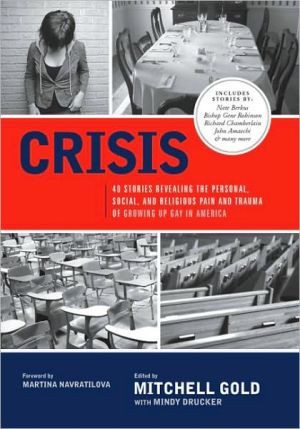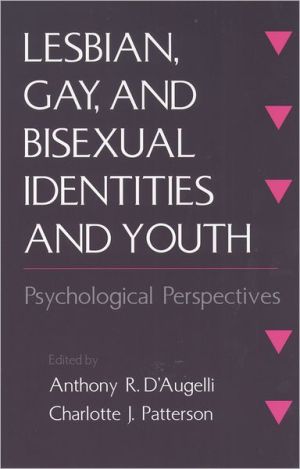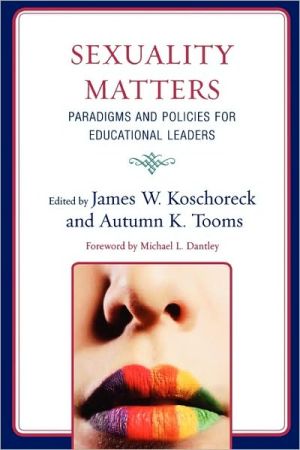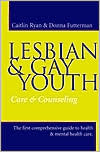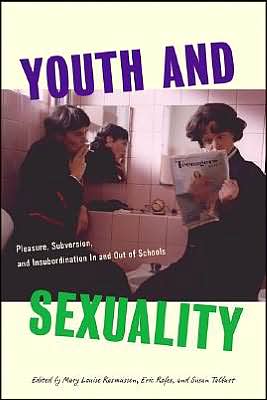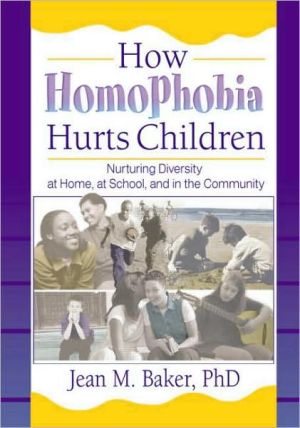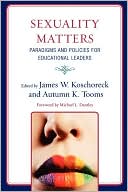Crisis: 40 Stories Revealing the Personal, Social, and Religious Pain and Trauma of Growing up Gay in America
A Mental Health Crisis Faces American Teens Right Now - and it is one we can solve. Hundreds of thousands of gay teens face traumatic depression, fear, rejection, persecution, and isolation-usually alone. Studies show they are 190 percent more likely to use drugs or alcohol and four times more likely to attempt suicide. Homophobia and discrimination are at the heart of their pain. Love, support, and acceptance-all within our power to give-can save them.\ This book is for clergy, parents,...
Search in google:
A Mental Health Crisis Faces American Teens Right Now - and it is one we can solve. Hundreds of thousands of gay teens face traumatic depression, fear, rejection, persecution, and isolation-usually alone. Studies show they are 190 percent more likely to use drugs or alcohol and four times more likely to attempt suicide. Homophobia and discrimination are at the heart of their pain. Love, support, and acceptance-all within our power to give-can save them.This book is for clergy, parents, educators, and politicians who may not realize the harm their words and actions can cause, as well as for supportive parents of gay teens; teens navigating this difficult time; and fair-minded people who want to help end the harm. Here are revealing stories by forty diverse Americans, some well known and some not, plus insights from straight clergy and parents explaining their support of gay people as whole human beings guaranteed equal rights by our Constitution.
CRISIS 40 STORIES REVEALING THE PERSONAL, SOCIAL, AND RELIGIOUS PAIN AND TRAUMA OF GROWING UP GAY IN AMERICA \ \ By MITCHELL GOLD MINDY DRUCKER Greenleaf Book Group Press \ Copyright © 2008 Mitchell Gold\ All right reserved.\ ISBN: 978-1-929774-10-4 \ \ \ Chapter One PART 1 Religious Discrimination \ Could You Live with Being Called an Abomination?\ BY DAN KARSLAKE Writer, Director, and Producer of For the Bible Tells Me So\ Last week I bought the gun. Yesterday I wrote the note. Last night I happened to see your show on PBS. And just knowing that someday, somewhere, I might be able to go back into a church with my head held high, I dropped the gun in the river. My mom never has to know.\ That's the e-mail I received from a gay kid in Iowa in 1998, the morning after a segment I produced about Rev. Irene Monroe aired nationally on PBS's gay news magazine In the Life. The piece was a simple profile of Reverend Monroe, a well-known "street theologian" at Harvard Divinity School who is also openly lesbian. Because Americans had never seen a person of deep faith who is also fully accepting ofher sexual orientation on national television before, I knew the story would be controversial. But I never dreamed that it would save a life.\ In subsequent e-mails with that boy from Iowa, I learned that he had felt completely overwhelmed because not only could he lose his biological family by coming out but also his church family, and indeed, God. Until he saw the story, he felt suicide was his only option. Yet there on television was a woman of deep faith who was also openly gay. I remember him asking, "Do you mean that I can be gay and still believe in God?"\ My answer was, "Absolutely."\ "Doesn't God hate me?"\ "Absolutely not."\ That gay kid in Iowa is the reason I recently made a film called For the Bible Tells Me So, and he's the reason why this book is so important. For hundreds of years, the Bible has been used to sanction discrimination, repression, and injustice around the world. It has been used to justify slavery, empower segregation, and excuse the subjugation of women-and the tradition continues. Today, a handful of religious passages are commonly exploited to justify condemnation of and violence against gay, lesbian, bisexual, and transgender people. (You can read more on this in Part 6 of the book, "The Sin Question.")\ But what most conservative Christians don't know-or conveniently forget to tell you-is that the Bible says absolutely nothing about homosexuality as we know and understand it today. In fact, the word homosexual didn't even appear in any Bible in any language until 1946! And whether you think Jesus was the Son of God, just another prophet, or even simply a myth, the story of Christ is all about embracing outcasts, not creating them. A church that makes an entire group of people outcasts and yet calls itself "Christian" simply doesn't make sense.\ As you'll read in the incredibly personal and compelling stories that follow, words of judgment and condemnation from the pulpit have pushed many gay people toward suicide. Gay folks are three to seven times more likely to attempt suicide, and most of those who survive say they tried to take their own lives because of what they'd heard about themselves from their church, synagogue, or mosque.\ What's even more sobering is that this condemnation doesn't only occur in the sanctuaries of religious institutions. Indeed, religion- based bigotry is echoed by many folks who rarely step into a church. The Bible is widely used to excuse discrimination at home, at school, and in the workplace by people without strong religious convictions to excuse their fear of gay people.\ The stories in this section tell what it's like to grow up in a religious environment and live a lie until one feels ready to undertake the monumental act of coming out under such conditions. My dear friend, the brilliant producer and manager Herb Hamsher, once noted that coming out is similar to the "hero's journey" described in Joseph Campbell's book The Power of Myth. Campbell says that in mythology, the "hero" must risk everything to fight for what he or she believes in and to be who he or she really is. That describes the coming-out process for many gay people. To be fully who God intended us to be, we must risk losing our families, our jobs, and sometimes our very existence.\ In this section are several such heroes who struggled to be authentic in the face of fierce religious condemnation-the Reverend Irene Monroe, whose TV appearance helped saved that young gay kid from Iowa, among them. And though they may have initially regarded their sexual orientation as their own "dirty little secret," each came to know that their gayness was as much a part of them as their skin or eye color.\ As Oprah Winfrey has said, in life, it all boils down to being authentic. I suspect that, like me, you will emerge from reading these stories newly inspired to live authentically, no matter what your personal story. We must all fully honor who God made us to be. Not doing so is the real sacrilege.\ For more information on the award-winning documentary For the Bible Tells Me So, please visit www.forthebibletellsmeso.org.\ REV. IRENE MONROE Minister and Public Theologian\ From the humblest of beginnings, Rev. Irene Monroe has never given up. Abandoned at six months old in a trash can in Fort Greene Park, in Brooklyn, Irene went on to graduate from Wellesley College and Union Theological Seminary at Columbia University. She served as a pastor at an African-American church before going to Harvard Divinity School as a Ford Fellow for her doctorate. Irene is a syndicated religion columnist for online and print media; you can read her writings on her website, irenemonroe.com. She also appeared in the film For the Bible Tells Me So, speaking so eloquently about how misinterpretations of the Bible hurt gay people.\ Her radiant smile, thoughtful message, and caring soul make her a role model for all of us. By the way she lives her life, you know Irene is a person of faith living in America and that she truly does have faith in America to do what's right.\ "I ain't raising no goddamn bulldagger up in my house. Before I do that I'll send your ass right back to that damn agency where I got you."\ Whenever my behavior revealed the slightest hint of masculinity, my foster mother always used those words to threaten me with expulsion from her house. My infraction one Saturday morning was getting caught playing an aggressive game of handball in the August heat with our neighbor's boys. Earlier that day, I had gone to Miss Pearl's Beauty Shop to have my black hair pressed, fried, dyed, and relaxed, and now I had sweated it out playing ball. Instead of hanging flat and listless on my shoulders, it had happily returned to its nappy roots, giving me, before it was fashionable, an Afro. Incensed by my behavior and the waste of her money, my foster mother made me stay home from church the following day. It was culturally unacceptable in those days for African-American women to publicly display their nappy hair, especially in the House of the Lord. And besides, many church members were already gossiping about my behavior. Their gossip shamed me because it shamed my foster mother.\ My residency in my foster mother's house was always tenuous. It hinged precariously on my being a number of things for her, one of which was a dainty little girl. I desperately tried to be that little girl. However, sometimes I failed her. And in those times, before I learned to censor my undainty ways, the wild and happy and athletic butch girl in me would break loose. And I realized, in those wondrously fleeting moments, that not only did I enjoy competitive rough-and-tumble sports with boys, but also the sexual exploration that came with the sensuous joy of a touchy-feely game of "doctor" with girls.\ At age six, my behavior was easily explained as precocious and cute; I was a tomboy who would outgrow this preadolescent phase once I learned cultural norms. However, by age sixteen I showed no signs of changing. Instead of precocious and cute, I was seen as a developmentally arrested teenager. The slang word for my "illness" was bulldagger, a colloquialism once commonly used in the African-American community to denote a masculine lesbian. This pejorative term had both tremendous sting and stigma, and my foster mother used it not only to spew her venom about my behavior but also to evoke fear in the hopes that it would straighten me out. It didn't.\ I like women!\ The realization of my attraction to them was affirmed weekly as I delighted in looking at the voluptuous mocha-colored to honey-brown complexioned centerfolds in Jet magazine. Oh how I dreamed of being sexy like those women so that they would lust and long for me the way men lusted and longed for them. And with my nightly fantasies of Jet centerfolds eyeing me, finally, I thought, I would make things up to my foster mother: Since I hadn't been able to be her dainty little girl, I would become her ultra-fem teenager.\ I probably shouldn't have told my foster mother the reason why I wanted to become ultra-fem-so other women would like me. She yelled at me for my twisted thoughts, warning me that I would be homeless if I didn't take her demands that I become a normal girl seriously. My minister said I would go to hell if I didn't rebuke the homosexual demon in me and be spiritually treated by him.\ As a ward of New York State, I had a third authority figure in my life: a social worker assigned to me by the Bureau of Child Welfare. And of the three-my mother, my minister, and my social worker-it was my social worker who showed the greatest optimism for my becoming a healthy heterosexual.\ According to her, my sexual confusion was a textbook case. Having lived with my birth mother for six months before she abandoned me in a trash can in Fort Greene Park in Brooklyn, my behavior was merely an expression of my continuing search for her. In her usual distant and clinical tone, my social worker explained that the "tactile deficit" experienced by a child deprived of a parent's touch during infancy is often expressed sexually with someone of the same gender as the missing parent. I interrupted her to point out that I was missing both parents. Annoyed, she snapped back that it was the gender of the parent I missed most or who had hurt me most. Both my foster mother and my minister accepted her explanation.\ So they sent me to weekly psychotherapy sessions, but I showed no progress. The child psychiatrist and my social worker seemed to realize I was incurably gay, incapable of modeling societal gender norms, and the frustration showed in their faces. At that point, my social worker gave me some advice: pretend to be straight.\ Here was her reasoning: In those days, before there were group homes and interracial adoption, African-American and Latino foster kids were the hardest to place (and still are). With many more children in need than foster homes available, my being a troubled African- American homosexual teenager assured me neither long-term housing nor permanent placement.\ Her stories of the many foster children thrown out of foster homes for lesser infractions than being homosexual scared me enough to act straight. Moreover, she believed in behavior modification to change dysfunctional behavior patterns and remediate damaged thinking so one can better interact with the world. With her advice, I began accessorizing myself with the outward accoutrements of heterosexual culture. Being captain of the girls track and volleyball teams kept the question of my sexual orientation on the front burner for my foster mother, minister, and social worker, so I became a cheerleader. My biggest and best cover-up was my six-foot-three high school basketball-playing boyfriend. And while the cover-up worked beautifully Monday through Friday at school, I never felt comfortable with the lie I had created when I was in church on Sunday.\ * * *\ The centrality of the black church in African-American communities shapes the attitudes and mores of both its "churched" and "unchurched" residents. I joined my church at age five, was baptized at six, and served on the junior usher board from ages six until sixteen, becoming president of the junior board by fifteen.\ I still remember the first day my minister called me into his study to share Jesus's special love for children. He read the Bible passage in Mark 10:13-16: "People were bringing little children to Jesus to have him touch them, but the disciples rebuked them. When Jesus saw this, he was indignant. He said to them, 'Let the little children come to me, and do not hinder them, for the kingdom of God belongs to such as these. I tell you the truth, anyone who will not receive the kingdom of God like a little child will never enter it.' And he took the children in his arms, put his hands on them and blessed them."\ He told me no other place in the world so welcomes all children-especially orphans-as the church. And since my church, a pillar of the community, was so welcoming, it was a nod for the larger community to welcome me, too. Growing up in the church was a refuge from the hostile and violent worlds of my environment and foster home, feeding and clothing me both physically and spiritually. To me, aside from Martin Luther King, Jr., my minister was one of the best representations of doing God's work in the world and an exemplary disciple of Jesus because he, like Jesus, loved me. Therefore I took his advice and admonitions about unjust acts and ungodly behavior seriously.\ Over the years, I frequently met with him in his office-to sign an embarrassing report card, explain receiving detention for cutting class, discuss why I wanted to join the Dance Theater of Harlem instead of going to college, debate scripture or world events, and get advice on how to be a good Christian.\ I will always remember my last visit to his office, when I was sixteen. It was my desire to be a good Christian that led me to make the appointment. When we met, I told him that my boyfriend wanted to have sex but the feeling wasn't mutual. I also confessed that if there were anyone I'd want to be with in that way, it would be my girlfriend.\ As always, he listened attentively. Then he came around the desk with his Bible in hand and told me to open my Bible. He read Leviticus 18:22: "Do not lie with a man as one lies with a woman; it is an abomination." Next he told me to read aloud Romans 1:26-27 in which Paul writes, "Because of this, God gave them over to shameful lusts. Even their women exchanged natural sexual relations for unnatural ones. In the same way the men also abandoned natural relations with women and were inflamed with lust for one another. Men committed shameful acts with other men, and received in themselves the due penalty for their error."\ When I finished reading, he slammed his Bible shut, knocked mine out of my hands, and said not only was I causing God's wrath, but also his own. Like my social worker, he too believed in behavior modification: He explained that if I pretended to like natural sexual relations with men I would eventually come to love it. However, he said, the best person to teach me was not my boyfriend, but him-and he was going to teach me now, once and for all.\ The scuffle that ensued caught the attention of two male deacons, who ran frantically down the hall and knocked on the door. When my minister swung the door open, the deacons could see furniture overturned and the contents of his desk on the floor. Noticing that my minister and I were both straightening our clothes, the deacons asked what was the matter. My minister said, "I was fighting this harlot off me. After all these years of being a father figure to her I couldn't imagine anything like this."\ News spread through the church and the community, with most people, even my foster mother, questioning the veracity of the story because there had been rumors of his predilection for young girls. Nevertheless, because I brought shame to the minister, in less than a week, with a black garbage bag of my worldly possessions in tow, I was an emergency placement in another foster home. When I told my new foster family what had happened, they threw me out of their house for fear that my homosexuality would lead me to prey on their other female foster kids or cause them to "catch it" from me.\ With no place to go-no help from the foster care agency and the loss of both my community and my church-I would have attempted to take my life were it not for the help of my high school guidance counselor and teachers.\ (Continues...)\ \ \ \ \ Excerpted from CRISIS by MITCHELL GOLD MINDY DRUCKER\ Copyright © 2008 by Mitchell Gold. Excerpted by permission.\ All rights reserved. No part of this excerpt may be reproduced or reprinted without permission in writing from the publisher.\ Excerpts are provided by Dial-A-Book Inc. solely for the personal use of visitors to this web site. \ \ \ Contents Foreword by Martina Navratilova....................ix\ Preface: Why This Book?....................xiii\ Stats I Wish I Didn't Have to Share....................xix\ Introduction: All I Ask Is Your Compassion....................xxi\ A Note on Language....................xxvii\ PART 1: RELIGIOUS DISCRIMINATION....................1\ Introduction by Dan Karslake....................3\ Rev. Irene Monroe....................7\ Rev. Dr. Mel White....................15\ The Right Reverend Gene Robinson....................25\ Bruce Bastian....................31\ H. Alexander Robinson....................37\ Ari Gold....................45\ Rodney Powell....................53\ Jody Huckaby....................61\ Matt Comer....................69\ Jared Horsford....................75\ Jarrod Parker....................83\ An Evangelical Christian Apologizes by Brent Childers....................91\ PART 2: FAMILY AND COMMUNITY REJECTION....................97\ Introduction by Charles Robbins....................99\ Richard Chamberlain....................105\ Mitchell Gold....................111\ Jorge Valencia....................119\ Nate Berkus....................127\ James McGreevey....................135\ Howard Bragman....................143\ Candace Gingrich....................149\ Bob Witeck....................155\ Donna Red Wing....................163\ Jim Hormel....................171\ Brandon Rolph Kneefel....................179\ Robert Wrasse....................185\ PART 3: SCHOOL AND SOCIAL DISCRIMINATION....................191\ Introduction by Kevin Jennings....................193\ Alec Mapa....................199\ Neil Giuliano....................205\ Brian Graden....................211\ Joe Solmonese....................219\ Bob Williams....................225\ Jacob Breslow....................231\ Katie Batza....................239\ Tony Meyer....................247\ Julia Brindisi....................253\ PART 4: IN THE WORKPLACE....................257\ Introduction by Lane Hudson....................259\ Billy Bean....................263\ Barney Frank....................271\ John Amaechi....................279\ Tammy Baldwin....................287\ Hilary Rosen....................295\ PART 5: WHAT I KNOW NOW: ON LOSING A CHILD....................299\ Mary Lou Wallner....................301\ Elke Kennedy....................307\ PART 6: THE SIN QUESTION....................313\ Looking to the Past for the Future....................315\ Homosexuality Is Not a Sin by Jimmy Creech....................321\ Homosexuality, the Bible, and Us by Rev. Dr. H. Stephen Shoemaker....................325\ PART 7: EXPOSÉ: A SILENT EPIDEMIC OF DEPRESSION, ISOLATION, AND FEAR....................335\ The Untold Story....................337\ RESOURCES....................349\ Organizations to Call....................351\ Organizations Not to Call....................361\ What Is Reparative Therapy?....................363\ ACKNOWLEDGMENTS....................367\ PHOTO CREDITS....................370
Foreword Martina Navratilova ixPreface: Why This Book? xiiiStats I Wish I Didn't Have to Share xixIntroduction: All I Ask Is Your Compassion xxiA Note on Language xxviiReligious Discrimination 1Introduction Dan Karslake 3Rev. Irene Monroe 7Rev. Dr. Mel White 15The Right Reverend Gene Robinson 25Bruce Bastian 31H. Alexander Robinson 37Ari Gold 45Rodney Powell 53Jody Huckaby 61Matt Comer 69Jared Horsford 75Jarrod Parker 83An Evangelical Christian Apologizes Brent Childers 91Family and Community Rejection 97Introduction Charles Robbins 99Richard Chamberlain 105Mitchell Gold 111Jorge Valencia 119Nate Berkus 127James McGreevey 135Howard Bragman 143Candace Gingrich 149Bob Witeck 155Donna Red Wing 163Jim Hormel 171Brandon Rolph Kneefel 179Robert Wrasse 185School and Social Discrimination 191Introduction Kevin Jennings 193Alec Mapa 199Neil Giuliano 205Brian Graden 211Joe Solmonese 219Bob Williams 225Jacob Breslow 231Katie Batza 239Tony Meyer 247Julia Brindisi 253In the Workplace 257Introduction Lane Hudson 259Billy Bean 263Barney Frank 271John Amaechi 279Tammy Baldwin 287Hilary Rosen 295What I Know Now: On Losing a Child 299Mary Lou Wallner 301Elke Kennedy 307The Sin Question 313Looking to the Past for the Future 315Homosexuality Is Not a Sin Jimmy Creech 321Homosexuality, the Bible, and Us Rev. Dr. H. Stephen Shoemaker 325Expose: A Silent Epidemic of Depression, Isolation, and Fear 335The Untold Story 337Resources 349Organizations to Call 351Organizations Not to Call 361What Is Reparative Therapy? 363Acknowledgments 367Photo Credits 370
